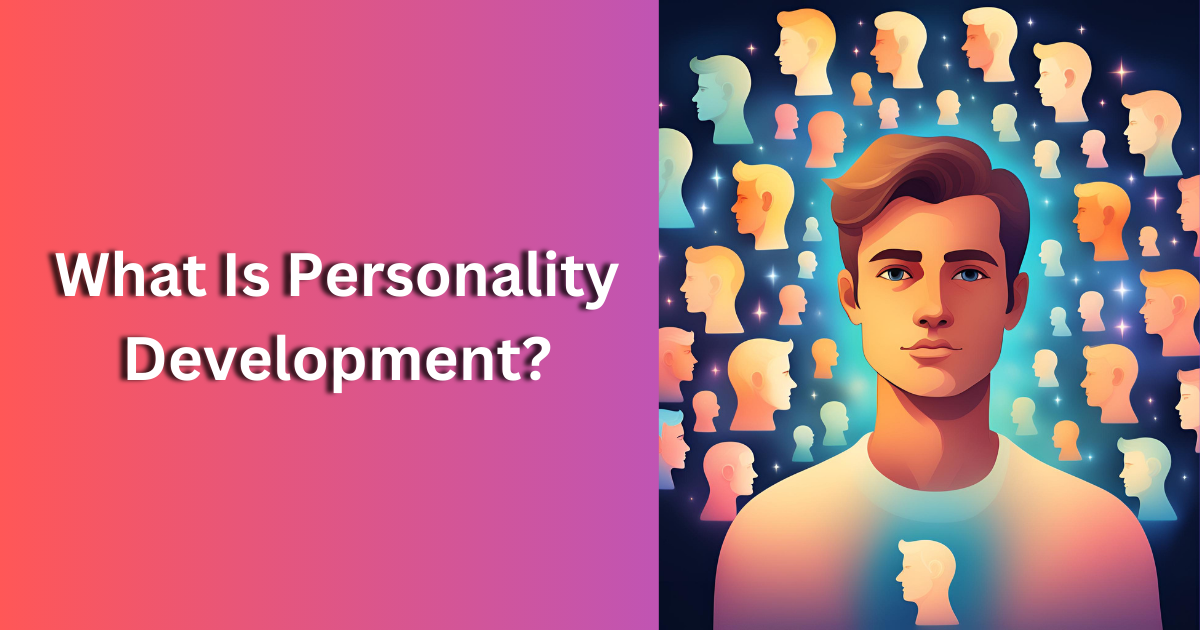What is personality development? The process of gradually shaping one’s character is known as personality development. While this occurs naturally most of the time, some qualities are modifiable. Outside influences significantly shape our personalities. Most of the time, a person’s personality is what draws us in when we first meet them.
A person’s ideas, expectations, and beliefs are shaped by their personality. Discover the factors that affect a person’s personality and find the answer to the question, “What is personality development?” with the aid of this blog.
Different Personality Types
A person’s personality is the culmination of all of their distinct traits, attitudes, and actions. It is often used to characterize interpersonal interactions in social contexts. Personalities come in a wide variety and may range greatly from person to person. Introverts, extroverts, optimists, pessimists, logical thinkers, emotional thinkers, and loyalists are a few of the more prevalent kinds.
Every one of these personality types has particular advantages and disadvantages of its own and may aid individuals in comprehending their actions and motives. Finding the right job path, developing deep relationships, and building effective teams is greatly aided by having a solid understanding of personality types. Let’s comprehend using the following four major categories:
The Contemplator
This personality type is often rational, objective, and analytical. They like solving problems and base their conclusions on information and facts. They could have emotional difficulties and want to keep things apart.
The Gregarious
This personality type tends to be chatty, gregarious, and enthusiastic. They often have a large social network of friends and like interacting with new individuals. They can find it difficult to finish activities and would rather concentrate on the here and now.
The Chief
This personality type tends to be self-assured, aggressive, and goal-oriented. They are often adept at strategic planning and love taking the lead and making choices. They might need help being too overpowering or indifferent to the needs of others.
The Advocate
This personality type is often caring, devoted, and empathic. They take pleasure in fostering harmony in their relationships and assisting others. They might find it difficult to make difficult choices and to be forceful when necessary.
How Does Personality Development Help Students? What Is It?
Put simply, personality development is the process of changing one’s personality for the better. Through this procedure, a person may discover their intrinsic abilities. However, these adjustments take time to manifest because this procedure takes time. Also, a variety of variables, including individual behaviour, thought patterns, and reaction patterns, influence the outcomes most of the time.
Let’s first examine the effects of personality development on an individual before talking about how personalities are developed.
Research has shown a number of intriguing advantages of personality development (via personality development activities). Observe them for a moment:
- Academic achievement may benefit from having a good personality.
- A positive outlook fosters well-being.
- Aids in the growth of the whole.
Characteristics that Affect Personality Development
One’s personality is an individual characteristic. It’s also critical to recognize that a variety of elements affect personality development. Below is a list of them:
Surroundings
Our environment and the people in it are like the painters who contribute to the portrait of our personality. There is a tremendous difference in the things we see and hear, the areas we live in, and our family. If you come from a large, talkative family, you may also appreciate sharing and conversing. Alternatively, you may come to appreciate music if you were raised in an environment where it was always present.
Social Exchanges
People we spend time with and friends have the power to alter who we are, as in picking up a new game from a supportive buddy. Additionally, you may pick up additional skills related to behavior and acting. Speaking with a variety of individuals opens our eyes to fresh perspectives on the world, which may inspire us to take risks or even modify our behavior.
There are many highs and lows in life, such as winning a game or having a difficult day. These encounters shape our responses to situations. Dealing with issues strengthens us and improves our understanding of ourselves. Thus, even if they are unpleasant, difficult situations aid in our development and boost our self-esteem.
Learning And Education
Attending school and acquiring new knowledge contributes to our personal growth. Think of education as an endless source of information. As we gain knowledge, we grow more intelligent and develop our ability to solve issues, think critically, and engage in meaningful interactions with others. Gaining knowledge boosts our self-esteem and facilitates communication of our views.
Technology And Media
The material we see online and the TV programs we watch may have an impact on our thoughts and emotions. The things we see in the media may influence our interests and the way we see the world, just as a buddy might influence your opinion of a new game by sharing their review. That’s how the media shapes your personality, for example, if you like superheroes because you’ve seen them on TV.
Practical Advice for Personality Development
Developing one’s personality is a journey. If someone is unsatisfied in any area, they may improve and develop positive traits in themselves.
Engage in Active Hearing
So how to develop personality? Talks at a workplace need to be two-way. Consider what other people have to say rather than just making sure you are heard. Making well-informed judgments requires listening to the opinions of customers and coworkers.
If someone is a good listener, they will be able to comprehend what the other person is saying and what that implies. Acquiring the talent of active listening not only enhances your personality but also propels you to new heights in your professional life.
Acquire New Proficiencies
Efficient workers always improve their skills. Updating knowledge and abilities may be done in both formal and informal methods. It can be through enrolling in courses to learn a new skill, learning a new language, or purchasing a new piece of software. These abilities will enable you to cultivate new personality characteristics and lead a much more successful and rewarding career. People will trust and want to work with you when you assume greater responsibility if you have the requisite abilities, which isn’t necessarily a bad thing.
- Seek Feedback: The ability to accept criticism is the finest measure of a person’s personality. Always ask seniors and peers for comments after finishing a job. Although receiving praise raises one’s self-esteem, constructive criticism must equally be accepted politely.
- Not only can receiving feedback help one understand oneself better, but it also plays a crucial role in one’s personal growth. As one’s profession progresses, getting input from others will be necessary to stay on course.
- It is requested that individuals monitor any issues that may arise at work and take prompt action to address them before they worsen.
- When something goes wrong, people might also seek advice from others to determine what went wrong and how to prevent making the same mistakes in the future.
Obtain a Guide
It is beneficial for newcomers to have mentors who understand and have been in their position before. These might be instructors, supervisors, older citizens, or anyone whose professional development path they wish to take.
If one is still trying to figure out where to start, finding someone who can assist them should be their initial course of action. Having a mentor may help someone succeed both professionally and personally.
Control Your Time And Work
Being organized was a crucial personality quality. If a person manages several projects, setting priorities will make it easier to complete urgent jobs first. Employees who maintain the organization will always meet deadlines and take on more responsibility.
It has been shown that people are more productive at their jobs the more time they devote to them. In a circumstance like this, someone who has no other time to do anything but work will wind up working nonstop. This provides few opportunities for mistakes to be made or remedied.
This allows people to maintain a work-life balance and devote time to their personal lives. Their personality will benefit from this.
How Can Schools Help Students Develop Their Personalities?
Schools provide a variety of personality development programmes for students’ overall growth. Furthermore, many prestigious schools explore important issues like how personality is formed and integrate encouraging techniques into their regular teaching methods. Starting with the goal-setting process, stakeholders and educational institutions may use personality development to advise students on how to organise various activities.
The objectives of character development
According to the Government of India’s Ministry of Skill Development, Entrepreneurship, Youth Affairs, and Sports, students’ personality development should include both short- and long-term objectives. These are listed in the following order:
Short-term objectives:
- Develop your leadership skills.
- to reach their full potential
- Encourage teamwork and the willingness to take calculated chances in order to build resilience.
Long-range objectives:
- Help to create the country
- Adopt secularism and democracy as your principles.
- Encourage the development of the country
- foster a feeling of peace in society
Conclusion: What is Personality Development?
The process of developing one’s personality is ongoing and impacted by a person’s genetics, surroundings, experiences, and relationships. Now that you know the definition of “personality development,” your comprehension of the elements that affect personality will become much simpler. Acknowledging its importance enables people to develop their characteristics, actions, and general outlook on life. This path of self-improvement enhances relationships, professions, and general well-being in addition to personal development.



